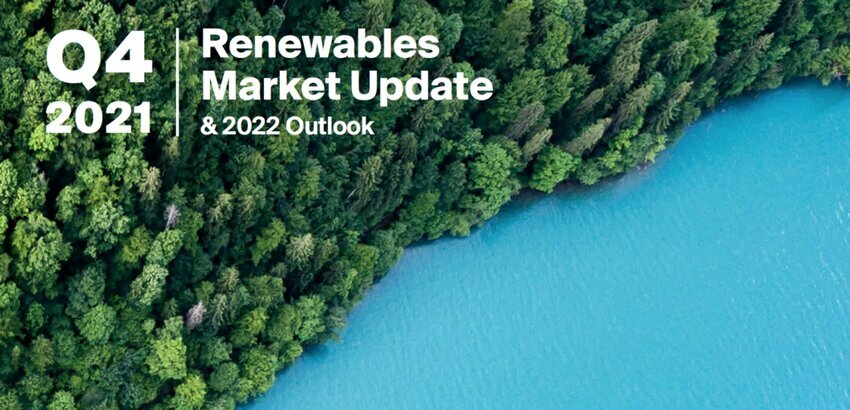 (Credit: Edison Energy)
(Credit: Edison Energy)Energy consultant Edison Energy published its Q4 2021 Renewables Market Update, predicting an easing of prices across the renewable energy sector by the end of 2022 given the downward trend of other commodity prices such as steel and aluminum. As the costs of the raw materials required for turbines and solar panels stabilize, providers will be able to offer more economical prices to their customers.
During 2021, the price of renewable energy power purchase agreements rose due to pandemic-related supply chain disruptions and subsequent inflation: p25 solar price increases ranged from 8% to 33% across U.S. deregulated wholesale markets. Factors driving these increases included higher prices for the raw materials that go into projects, spikes in transportation costs due to logistical challenges, and labor shortages in the construction sector.
Nonetheless, corporate demand for renewable energy and sustainable commodities continued to grow in North America and Europe as many corporations work toward 2025 climate targets. Corporations felt pressure to act swiftly, as project inventory is now dominated by online dates in 2024 and beyond. Compared to Q3 2022, the number of projects on the market with 2024 online dates are up 10% to 68 projects, while the number of projects available for contracting that are expected to be operating in 2022 are down by 75% to 3 projects. This trend is attributable to rising demand for renewable energy as well as long development cycles due to permitting and interconnection timelines.
With regard to renewable energy credits, national prices stabilized at $4 per credit after a volatile Q3 2021 in which prices reached $7 per credit. However, regional RECs are exhibiting the opposite trend: in the PJM compliance market, RECs have risen to around $19 per credit, up from $16 at the beginning of the quarter.
The carbon offset market continued to grow, officially crossing a $1 billion value. Project pricing went up between 50% and 100% again in Q4 2021. The Science Based Target Initiative recently formalized their criteria for Net Zero, allowing only offsets that remove existing carbon from the atmosphere to qualify for emissions reductions, rather than offsets that reduce future carbon from being released into the atmosphere. The consequential spike in demand for removal offsets has put upward pressure on prices.
The passage of the Build Back Better Act is anticipated to help ease prices given its clean energy tax credit extensions and investments. Even if it does not pass, Edison believes that its climate provisions could be enacted by other means.